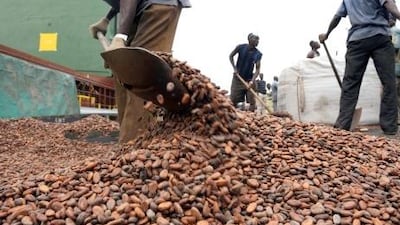Chocolate lovers face the prospect of having to tighten their belts after the price of cocoa soared to a 12-month high yesterday.
Cocoa futures for the March delivery market reached US$3,311 (Dh11,059) per tonne, their highest level since last January, as an export ban on cocoa in Ivory Coast rattled world markets.
The rise in the price of cocoa beans follows a year that saw rapid rises in food prices worldwide.
The UN Food and Agriculture Organisation's index of food prices rose 19.1 per cent last month compared with December 2009. The index averages staple products including meat, dairy products, cereals and sugar, but excludes chocolate.
Chocolate makers in the region said the increase in price would hurt their income in the fast-growing confectionary market.
"Of course we are not happy about the increase, unfortunately there is not much that can be done," said Tina Memic, the retail manager at Bateel International, a Saudi-based maker of gourmet chocolates and dates. "We had to accept the price increase, as we are not willing to compromise the quality of chocolates we offer."
UAE residents are expected to consume 9,069.5 tonnes of chocolate sweets this year, an increase of 5.5 per cent on last year, according to Euromonitor, the market research company. Sales of chocolate confectionary rose 12 per cent last year to an estimated Dh817 million.
The price rise comes as Ivory Coast imposed an export ban on cocoa beans in the latest gambit to unseat Laurent Gbagbo, who has refused to leave the presidency in the face of pressure from the international community.
On Sunday, the government of the president-elect Alassane Ouattara sent a letter to leading cocoa exporters asking them to stop overseas shipments for one month.
The country accounts for about 40 per cent of global cocoa exports, and export revenues from the trade go into the National Coffee and Cocoa Management Committee, which Mr Gbagbo controls.
"Last week we had a meeting with the main cocoa exporters in Ivory Coast and they have agreed to suspend exports for a month," Malick Tohe, an adviser to Mr Ouattara's government, told Bloomberg.
Rob Simmons, the head of coffee and cocoa research at LMC International, the agriculture consultancy, said the export ban would have a huge effect on the world cocoa trade. "You're fairly limited in where you can get sources from," he said.
However, he added that despite the current rise in cocoa prices, the bean had proved remarkably more stable than other commodities during the past year, largely due to a small surplus of production worldwide.
Cocoa "was quite badly hit by the recession and demand took a big hit", he said.
Some increase in demand had been seen, Mr Simmons said, which was "primarily western consumers coming back, but in the background we do have some demand from emerging markets which didn't really stop".
Brazil was emerging as a big market for powder chocolate, while some Asian markets and Saudi Arabia had also increased demand for cocoa beans.

